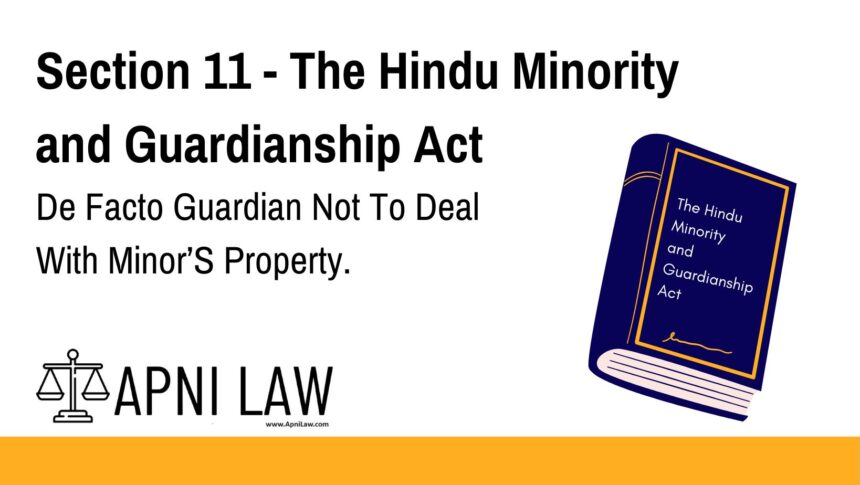Code
“After the commencement of this Act, no person shall be entitled to dispose of, or deal with, the property of a Hindu minor merely on the ground of his or her being the de facto guardian of the minor.”
— Section 11, The Hindu Minority and Guardianship Act, 1956
Explanation
Section 11 aims to safeguard the property rights of Hindu minors by strictly prohibiting unauthorized dealings by de facto guardians. A de facto guardian is someone who takes care of a minor without being legally appointed by the Court or recognized under law.
Key points:
-
De facto guardians have no authority to dispose of or manage a Hindu minor’s property.
-
Legal guardianship is required for any such transaction to be valid.
-
This section nullifies any customary or religious practices that may have previously allowed such dealings.
This statutory provision upholds the best interests of minors and reinforces the legal requirement for formal guardianship in matters involving their property.
Illustration
🔹 Example:
Ravi, an uncle, starts caring for his orphaned niece, Meera, who is 12 years old. He decides to sell her inherited farmland to raise money for her education. However, Ravi is not legally appointed as her guardian.
📌 Under Section 11, Ravi cannot sell the land just because he is taking care of Meera. Such a transaction would be considered illegal.
Common Questions & Answers
Q1: Who is a “de facto guardian”?
A de facto guardian is someone who assumes responsibility for a minor without any formal legal recognition or appointment by the Court.
Q2: Can a de facto guardian lease, mortgage, or sell a minor’s property?
No. Under Section 11, such transactions are prohibited and have no legal validity unless the person is a legally recognized guardian.
Q3: What if the de facto guardian acts in the minor’s best interest?
Even if done with good intentions, the action remains unlawful under Section 11. Only a legally appointed guardian can take such decisions.
Q4: Can the minor challenge the transaction later?
Yes. Once the minor attains majority, they can challenge and get the transaction declared void.
Conclusion
Section 11 of the Hindu Minority and Guardianship Act, 1956 serves a crucial role in protecting the interests of Hindu minors. It eliminates any scope for unauthorized individuals to exploit or mishandle a minor’s property by pretending to be caretakers. The law demands formal legal guardianship for any property-related decision, thereby upholding minors’ rights and ensuring accountability in guardianship matters.
For more legal explanations, case laws, and bare act analysis, visit 🔗 ApniLaw.










